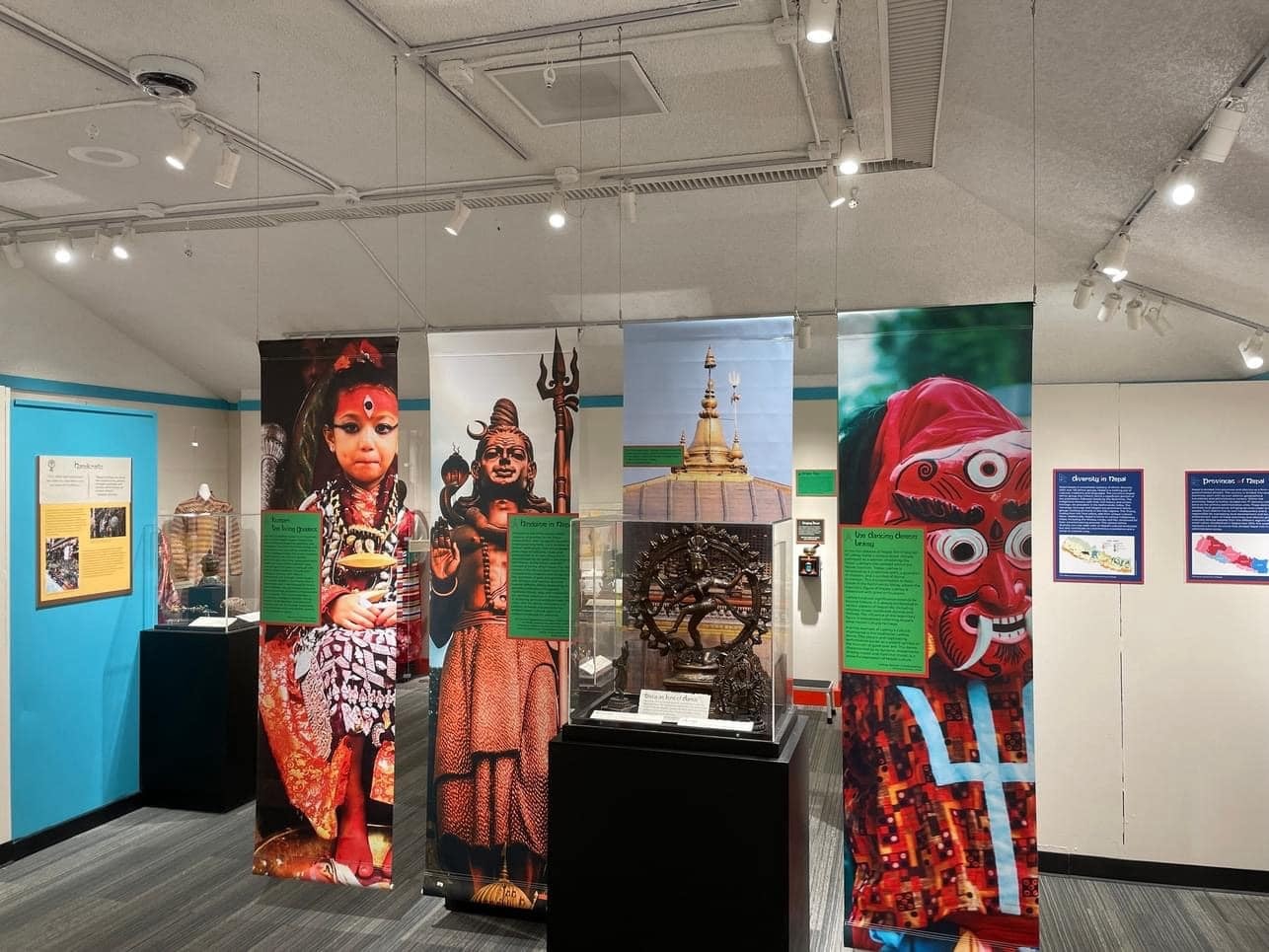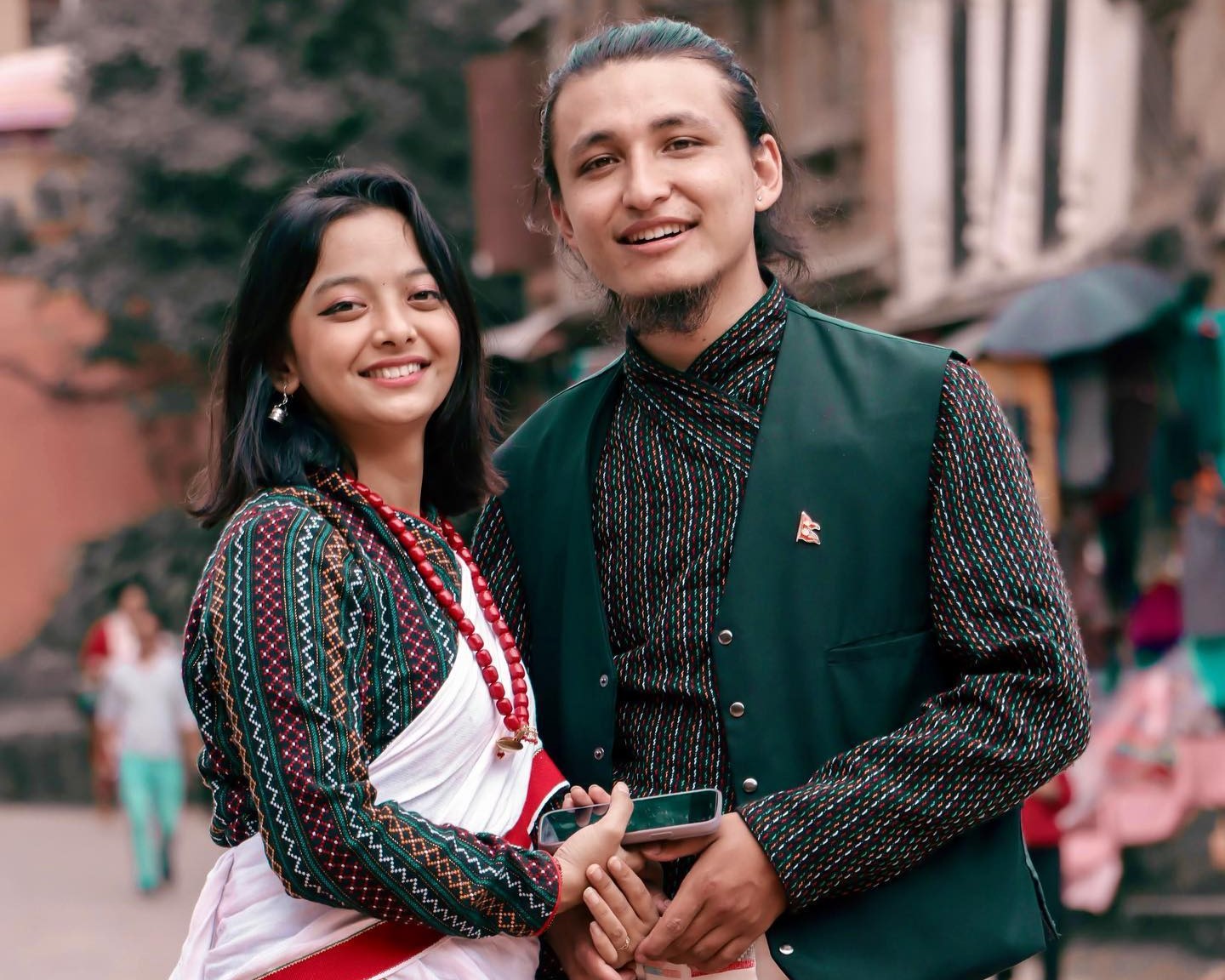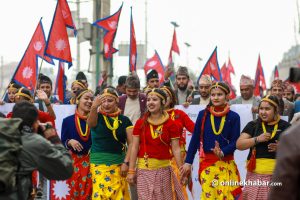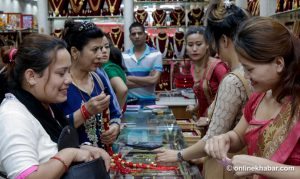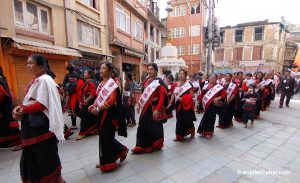
Sanyukta Shrestha, in his teens, thought that Nepali and Sanskrit were more important languages than his own community’s Nepal Bhasha, commonly called Newari. Though born in a Newar family in Naxal in Kathmandu, Shrestha thought he would not need Newari for his life—because Nepali and English would be enough. Instead, he developed his interest in Sanskrit thinking it would make him more sophisticated and classy.
It was only in his late 20s, four years after leaving home and starting an ‘exciting’ life abroad, that Shrestha realised the importance of his language. It seems that living in the foreign land was the key factor behind his realisation. Now, around one decade after recognising the importance of his own culture, Shrestha has transformed himself into a campaigner advocating for the protection and promotion of cultures and traditions of Newars and Nepali communities in the United Kingdom.
Shrestha, in fact, is not alone. He is just a part of an active organisation of Nepalis in Britain, which has been working for last 18 years to promote multiple aspects of culture including languages, festivals, dances and songs, and even games. The story of Shrestha and his organisation can give an insight into why preserving community cultures is helpful in shaping one’s identity in a globalised world.
A case in point

At the age of 25, in 2004, Shrestha moved to London of United Kingdom for his studies. His newlywed wife, also a Newar from Damauli of Tanahun district, followed him. Being a Newar born and raised outside Kathmandu, his wife found Newari even stranger.
Shrestha had, of course, expected that he would forget his community while in the UK, but it would not be any problem. Of course, he was going to meet few Newars, he would have less parties to attend and less cultural issues to talk about. He had never thought that he would have to regret one day for not knowing Newari.
In fact, the London life met all his expectations for the first four years.
In 2008, Shrestha’s first child was born. While trying to be a dutiful father, Shrestha wished if the child’s grandparents were there as they could teach him many things. “Then, contemplating on my son’s learning experiences and cognitive development, I realised that I also failed to learn something because I did not have my grandparents in my nuclear family. It took me few more days to figure out that it was my culture,” he says, “Therefore, even in the absence of his grandparents, I wanted my son to learn our language and culture which I myself was short of.”
But, when there’s a will there’s a way. A software developer by profession, Shrestha learned from acquaintances that some libraries in the British capital was well-stocked on languages and cultures of Nepal. “Therefore, I began to visit a library every Friday for a couple of hours, for entire one year, so as to learn language,” he shares, adding, “On the other hand, found one organisation named Pasa Puchah Guthi UK which provided me an excellent platform to exercise my skills.”
Yes—the Guthi was just a platform for Shrestha when he joined it in 2010. Now, he claims it has been a part of everyday life, for himself, and for around 1,500 Nepalis living in the United Kingdom, who have been members of the team.
Organised effort to protect ‘Nepali’ culture
Pasa Puchah Guthi UK, which its members refer to as Guthi or PPGUK, was established in the first year of this millennium, four years before Shrestha arrived in the British capital. “Ten Nepali friends from different walks of life met in London and established the organisation with a purely cultural motive of promoting and working towards preservation of Newar cultural heritage in the UK,” Shrestha who continuously has been a part of this organisation for the last eight years informs, “But, this Guthi is open to all, all Nepalis from all ethnic groups.”

Since the establishment, the Guthi, which now boasts a membership of 1,500 divided into four geographic branches in the UK, has been organising various events representing native Nepali culture. They include annual Mha Puja, Ihi, Kyeta Puja, Yomari Punhi, Kwaati Punhi, picnics, film shows, scholarly seminars and workshops and sports competitions.
By their name and nature, most of the events originate in the Newari culture. So, how can it claim it to be a representative of the entire Nepali nationality? Shrestha cleverly answers, “One of the founders, late JB Tondon, himself was from outside the Newar community. Hundreds of guests in all our events belong to various other ethnic communities of Nepal, and they enjoy our culture, while we feel immense pride to have served them with authentic ‘Newah’ hospitality.”
Further, he argues that Newars have dominance over activities of the organisation just because members of this community have a complete set of culture to showcase their culture in front of others. “We can do proper justice to individual cultures only by dedicating so much of time and resource with proper focus,” he explains, “When it comes to London-wide and UK-wide cultural shows, we always look forward to participating as a member of the Nepali national team, and in this way, we bring the genuine package from at least the Newar culture that we know the best of.”

Parhaps Shrestha is right. Tribeni Gurung, a representative non-Newar [because her father is Gurung] Nepali youth living in London, shares that she has been engaged in Guthi’s activities since her childhood. Gurung did not migrate from Nepal, but was born in the UK. Currently the General Secretary of Guthi’s London brach, Gurung says she has been fascinated by the way the organisation has worked to sustain Newari heritage and culture even in a foreign land and it can be an inspiration for other communities too.
The skills transfer game
If you have now concluded that activities of Guthi in the UK are just boring for people who do not have much devotion to its serious mission, you might be wrong. Just take an example of a game event that the organisation facilitated last week.
One of the Guthi members, Sushil Prajapati, who originally hails from Bhaktapur, came up with an brilliant idea of teaching an endangered game from this community, not only to Newars, even not only to Nepalis, but to everyone interested to join the event. As it was the weekend (last Saturday, June 9), some British friends of Guthi members also showed up to learn about games like Kassi Pyacha, which Bhaktapur men play at Wakupati Narayan temple premises in the ancient town.
Shrestha, who introduces himself also as a game enthusiast, says games have been one of the major focuses of the organisation for last few years. A software developer by profession, he has developed some computer games too. In this process, he always wanted to bring traditional games to the modern technologies. “Therefore, I studied a lot about some hundred traditional games of Newars,” he said adding, “In 2011 and 2012, we even organised picnics focused on many traditional games like Gha: Kasa, Dhu: Kasa, Jajanka Kasa and Bhutimali. Many of these games are fast disappearing and need preservation.”

So are traditional songs, dances and musical instruments.
Prajapati, besides teaching games, is active in the transfer of other forms of traditional knowledge and skills. He is a skilled Dhimey player and has launched a Dhimay training course to children. So far six kids have learned playing the traditional musical instrument. “Five of them were born and raised in London,” Prajapati says, “Therefore, it has been both interesting and challenging to me.”
Likewise, he has taught Bhairab Nach to around two dozen people. “For learning both dance and music, the first challenge is to memorise the music tunes exactly as a song and most traditional Newa music tunes are difficult to sing and the words have no specific meanings. It is just like singing a Korean or Spanish song by heart without knowing the words or meanings.”
Besides fun activities, the organisation is actively involved in few ‘scholarly’ projects. For example in association with School of Oriental and African Studies, University of London, it organises various seminars and interactions on a regular basis. As the SOAS is regarded an academic authority in the field of sociology, anthropology and cultural studies globally, such activities have helped the Guthi come out of the ‘Newar’ shell and develop itself as an institute to study entire Nepali culture, according to Shrestha.
Cultural identity in the globalised world

Portraying oneself as a member of a cultural group is quite a tricky issue in the modern world as the world is apparently turning ‘global’: The movement of technologies and ideas is faster than ever; institutions and individuals are becoming more open to changes and mingling. More importantly, every society is interconnected and interdependent. It seems globalisation is an inevitable truth—you cannot just deny it. Therefore, cultural identity is an obsolete issue.
But, Shrestha has a different observation. Whereas most people living in Nepal may think that Britons are less concerned about their culture as their culture is the mainstream in the global sphere, he says the reality is exactly opposite.
“If you go to Ireland, you can see the great Irish culture. Scotland—it is completely different and people present you with their own music, and costumes, and architecture, and they are so proud of it,” he says, “As Nepalis who have moved to the UK, this is something we need to learn: preserve your heritage, add to the diversity and strengthen the national identity, not by eliminating any ethnicity or overriding any community.”
He claims the Nepalis of the new generation who are born and/or educated in the UK are also learning this. “No one needs to teach them; neither time nor their parents. As parents, we just need to tell them what is in our culture, but not all parents know everything, and not everything is possible for us to fulfill. That’s where an organisation like Guthi comes in the picture. It makes it possible for a child to see Lakhay dance in London, or have Newahbhwoye (Newari Bhoj) in Aldershot, for instance.”
Therefore, preparing the new generation of Nepalis living in the UK with knowledge and skills about their communities’ cultures and traditions is the top priority for the organisation for now, says Shrestha who has been in the organisation’s executive board for last 10 years and is thinking of taking the leadership role from this year on.

“Of course, some people do not care about their culture, and that is completely their choice. However, we do our best to keep it alive wherever we are. Even for the kids of those who never participated in cultural activities in the UK, if they ever have to search for their roots, they need not be disappointed.”
It means Shrestha’s 10-year-old son and four-year-old daughter are free to tell their dad that they do not want to participate in the Guthi events. But, Shrestha will always be happy to help them locate their roots if they get interested some day.
“Both of my kids can talk in Newari with each other now,” the happy and confident father laughs as he shares, “But, even if they forget later, they need not be disappointed. We are here and will be here whenever they need any help.”
Photos: Pasa Puchah Guthi






